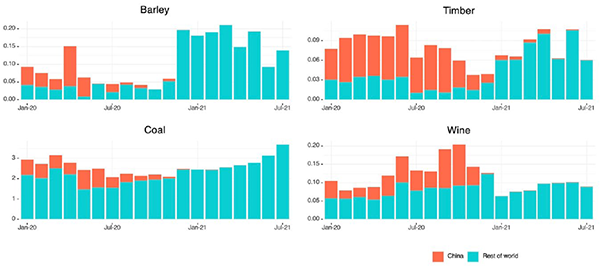| Author Name | Shiro ARMSTRONG (Visiting Fellow, RIETI) |
|---|---|
| Download / Links |
This Non Technical Summary does not constitute part of the above-captioned Discussion Paper but has been prepared for the purpose of providing a bold outline of the paper, based on findings from the analysis for the paper and focusing primarily on their implications for policy. For details of the analysis, read the captioned Discussion Paper. Views expressed in this Non Technical Summary are solely those of the individual author(s), and do not necessarily represent the views of the Research Institute of Economy, Trade and Industry (RIETI).
The United States and China, the world’s two largest economies, are locked into strategic competition and rivalry that complicates international policy choices for the rest of the world, but particularly for their partners in Asia. Economics and security are increasingly entangled in a way that may cause damage to both, creating a dangerous trade-off and a negative feedback loop on both economic and security outcomes. Economic coercion is being deployed to narrow choices for countries.
The open multilateral trading system is under threat. A loss of confidence in the WTO will unravel the deep and complex economic interdependence in East Asia and make political differences difficult to manage. The existing network of bilateral, plurilateral and regional agreements that is the scaffolding of the multilateral trading system is no substitute for the WTO that is the structural pillar of the economic order. The gaps in membership and coverage of rules will likely fragment the global economic system without a functioning WTO at its core.
Open markets underpinned by the multilateral trading system give firms and consumers alternative sources and markets in the face of shocks, both economic and political. Fragmentation of the trading system or rising protectionism will amplify risk by reducing options and impede adjustment to shocks. Open international markets diffuse power and are a source of resilience.
Economic engagement and integration into markets reduces the costs of harmful international behavior for targeted countries and raises the costs of those actions for malignant actors. Interdependence enhances national security, but inevitably involves some security risk. If security concerns and policies dominate economic choices, the policy space is narrowed significantly. It is the important job of security agencies to look for and mitigate risks, but economic interests also need to be balanced. Risks can be mitigated through a combination of international cooperation, multilateral rules and strong domestic laws.
Reducing trade or investment to avoid security risks is not the right strategic response in a world of integrated markets and economies, unless countries want to be poorer, weaker, and live in a less certain and stable world. These are shared challenges and opportunities for countries navigating a more complex world.
Large powers, like the United States and China, naturally prefer to deal with countries bilaterally where the asymmetry of their power offers most leverage. That forces the world into even harder choices. The United States and China left to their own devices may try to decouple their economies and divide the global economy into two spheres. They are big and influential players in the system but the response of the rest of the world to their behavior will be important to the outcome.
Small and middle powers need to get the balance of economics and security right in strategic policy making and work together to avoid a big-power dominated, bilateral world of zero-sum outcomes. Acting strategically and not falling into bilateralism is for them the sensible way forward. Agreements that support, and do not detract from, multilateral outcomes will help to preserve and expand policy options for countries in the region and make them better off economically and more secure, instead of poorer, weaker and less secure.
One of the most blatant recent experiences of attempted economic coercion demonstrates what protection small and middle powers have. From May 2020, Beijing blocked the import of a dozen or so Australian goods worth around $20 billion annually including coal, wine, barley, timber and lobsters where China was the major market (see Figure). The trade sanctions caused Australian exporters, especially wine and lobster exporters, huge losses. Most Australian exporters, however, were able to quickly find other markets. Imports of barley, coal, and other commodities in China did not shrink, and exporters from countries other than Australia replaced Australia in filling that demand. Australian exporters in turn filled the new demand for those commodities outside of China. Flexible markets in Australia helped, but the crucial external source of resilience was an open multilateral trading system which ensures that trading options remain open. Beijing’s economic weaponry was blunted by that system with the WTO, despite all its weaknesses, at its core.

[Click to enlarge]
This paper demonstrates the security value of the multilateral trading system and economic interdependence. Economic coercion is blunted by an open multilateral trading system that significantly reduces the cost to targeted countries. Multilateral engagement helps manage important risks that countries face by diffusing power and providing forums for collective action by small and middle powers that provide leverage.

